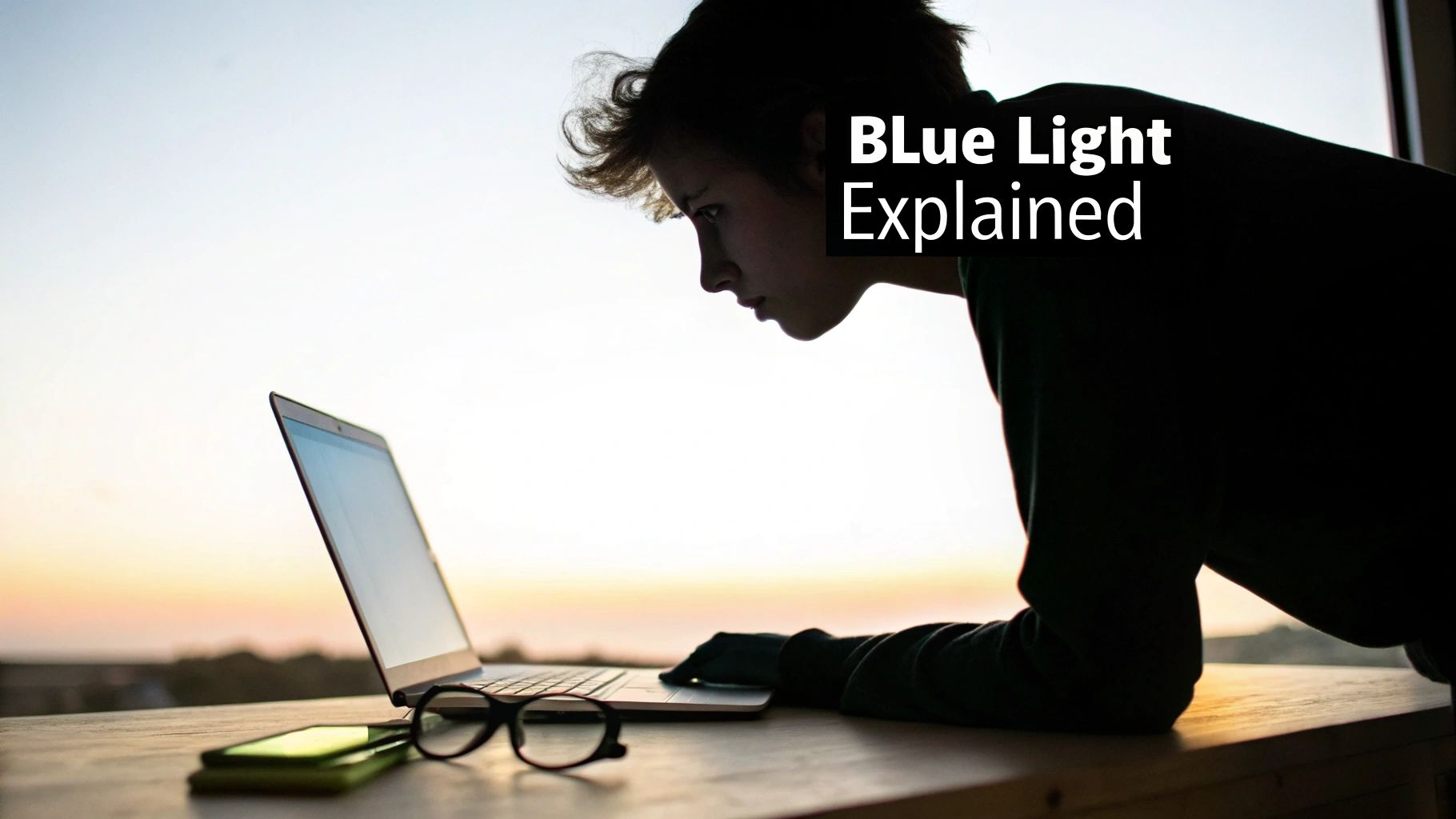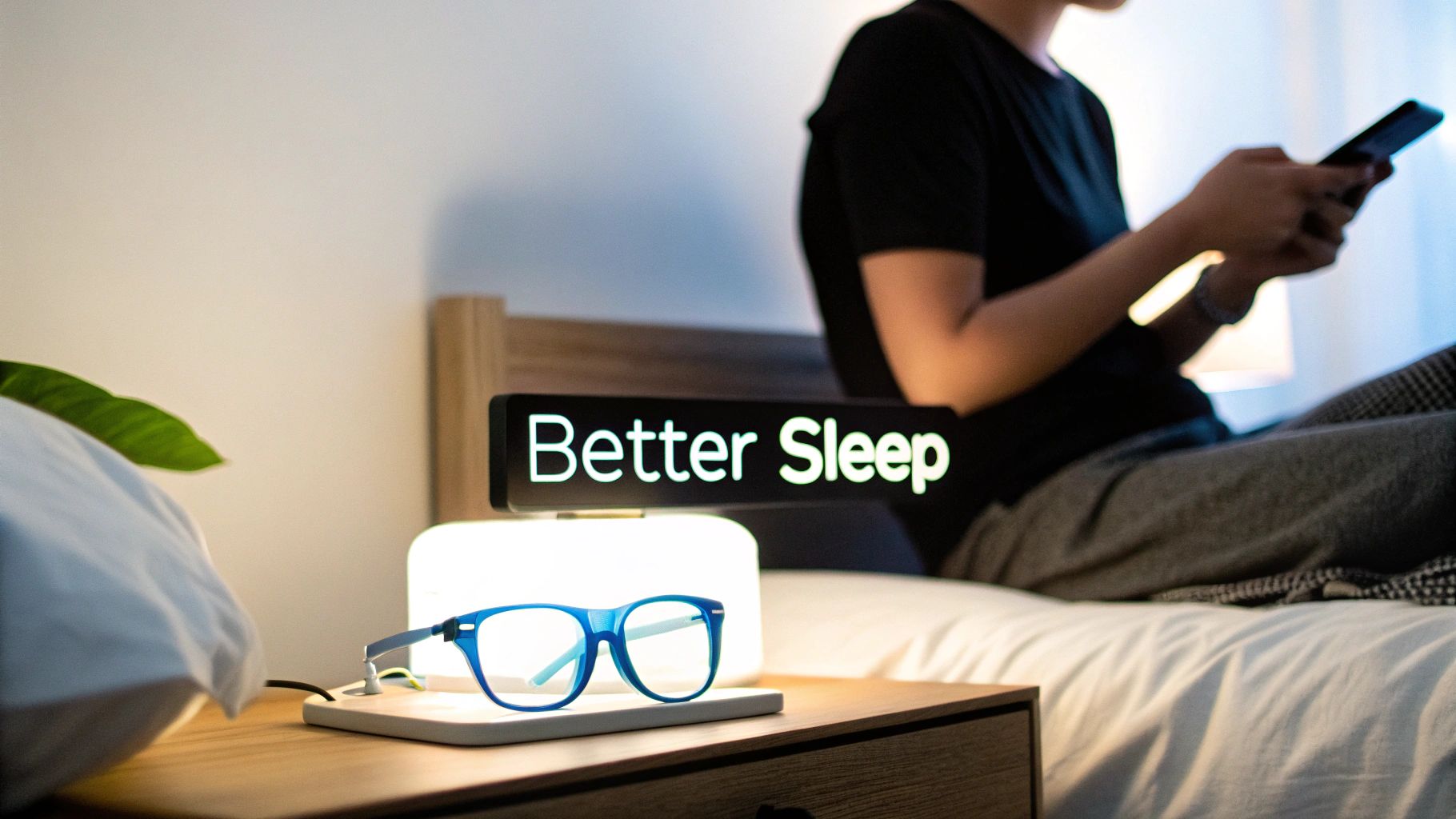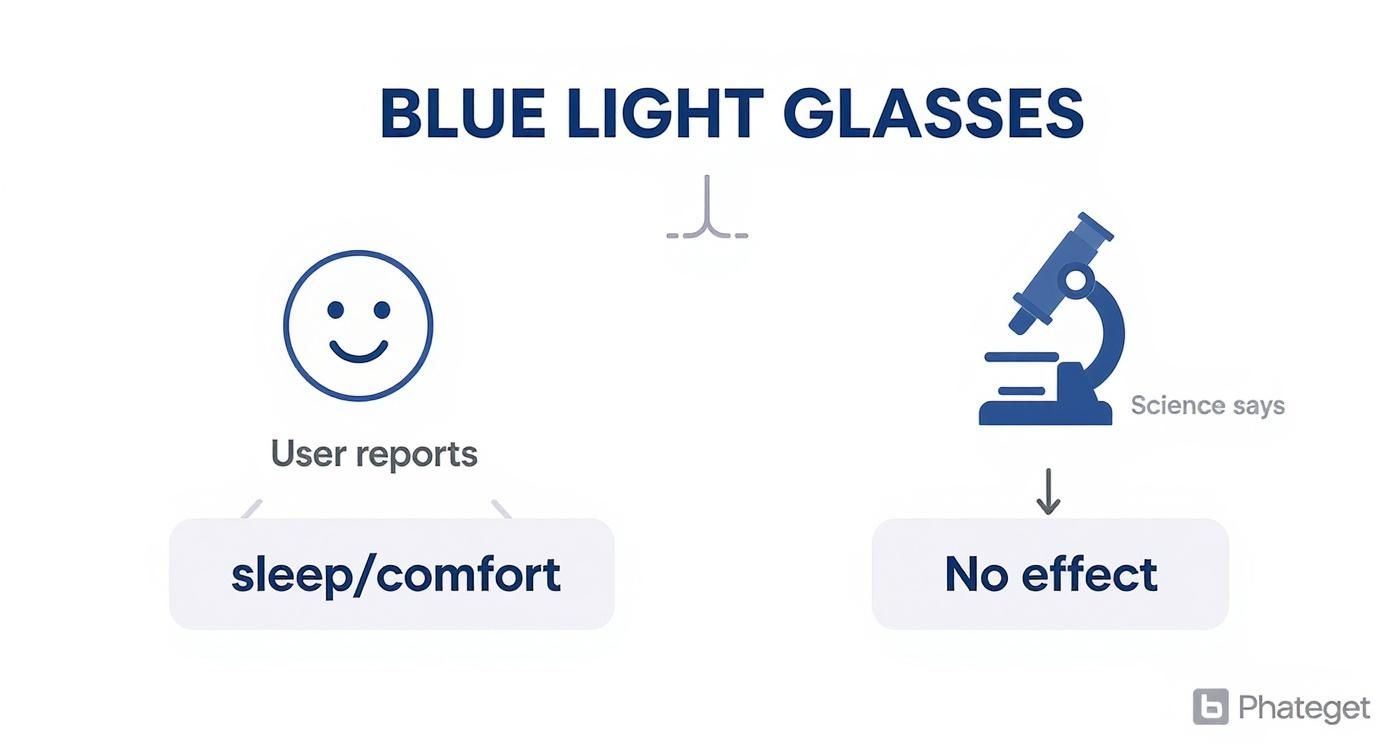The primary benefits of blue light glasses are straightforward and focus on your ocular health and comfort: they can significantly reduce digital eye strain and help regulate your natural sleep cycle. By filtering a portion of the high-energy blue light emitted from digital screens, these lenses are designed to make your daily screen time safer, more comfortable, and less disruptive to your body's internal clock.
What Is Blue Light and How Does It Cause Eye Strain?

So, what exactly is blue light? Think of it as a high-frequency, high-energy wavelength of light. While the sun is our largest natural source, the modern concern for eye health stems from the prolonged, close-range exposure we get from digital screens—our phones, laptops, and tablets.
This constant bombardment of high-energy light is a key factor in the widespread issue of digital eye strain, also known as computer vision syndrome. Protecting our eyes from this fatigue has become a critical focus for long-term eye health and safety in our screen-centric world.
Understanding Digital Fatigue
Have you ever ended a long day of screen use with a gritty, tired feeling in your eyes? Or perhaps a persistent, dull headache and vision that seems slightly blurry? That's digital fatigue. For a practical example, consider an accountant during tax season, staring at spreadsheets for ten hours a day. Their eyes are constantly working to process the harsh light and maintain focus, leading directly to strain.
Because of its high-energy nature, blue light scatters more easily than other visible light. This creates a sort of visual "noise" that reduces the contrast on your screen, forcing your eyes to work harder to focus. Over time, that sustained effort leads to physical discomfort and fatigue. It's for this reason that many people are exploring the blue light glasses benefits as a proactive measure for their eye health.
The concern is real. In Australia, around 2018-2019, roughly 75% of optometrists were prescribing blue light lenses, largely driven by patient worries over eye strain and the potential effects of all that daily screen time.
If you are particularly sensitive to bright lights, you might find our guide on glasses specifically for light sensitivity helpful. We understand that every individual's visual needs are different, which is why we can customize an eye wear package to suit your requirements.
How Blue Light Glasses Can Improve Your Sleep Quality

One of the most significant eye health benefits attributed to blue light glasses is the potential for better sleep. Your body's internal clock, or circadian rhythm, is heavily influenced by a hormone called melatonin. As daylight fades, your brain naturally increases melatonin production, which signals to your body that it's time to wind down and prepare for sleep.
The problem is that the artificial blue light from our screens disrupts this natural process. Exposure to this high-energy light in the evening can trick your brain into thinking it's still daytime. This suppresses melatonin production, effectively leaving your internal "sleep switch" stuck in the 'on' position, making it harder to fall asleep.
This is a key area where focusing on your eye health can have a ripple effect on your overall well-being. By wearing blue light filtering glasses for a couple of hours before bed, you create a protective barrier against these confusing light signals. This allows your body to resume its natural melatonin production, promoting a healthier sleep cycle.
What This Looks Like in Real Life
Integrating blue light glasses into your evening routine is a simple, practical step for better sleep hygiene. Here are some examples of how they can help improve your health and safety:
- The Late-Night Professional: If you're finalising a report after hours, wearing blue light glasses can prevent the screen's stimulating light from interfering with your ability to unwind and fall asleep later.
- The Evening Gamer: For gamers, long sessions involve intense visual focus on bright, dynamic screens. The glasses can help your brain transition from a state of high alert to one that is ready for restorative sleep.
- The Bedtime Scroller: If your pre-sleep ritual includes scrolling through social media, the glasses act as a crucial safety filter. They block the specific blue light wavelengths most known for disrupting your ability to drift off.
By filtering the most disruptive light, these glasses support your body's natural sleep preparation. This isn't just about falling asleep faster; it's about achieving deeper, more restorative rest, which is essential for overall health.
Of course, managing light exposure is just one component. For a holistic approach, consider crafting a relaxing evening routine for better sleep. Everyone’s lifestyle is different, which is why we can customize an eye wear package to suit your requirements and support your personal health goals.
Reducing Digital Eye Strain for Greater Comfort

If you've ever experienced that gritty, tired sensation in your eyes after hours in front of a computer, you're familiar with digital eye strain. Addressing this discomfort is a major reason people seek out blue light glasses, as they are specifically designed to make screen time more comfortable and support long-term eye health and safety.
These specialized lenses work by filtering a percentage of the high-energy visible (HEV) blue light that digital screens emit. This filtering action can reduce screen glare and improve contrast, making on-screen content appear sharper and less harsh. As a result, your eye muscles don't have to strain as much to maintain focus, which can significantly reduce fatigue and discomfort.
Easing the Burden on Your Eyes
Consider a practical example: a university student researching and writing an essay for six consecutive hours. Without a filter, their eyes are in a constant state of tension, leading to squinting, which can cause headaches and neck pain. Blue light glasses can soften the screen's harshness, making the visual experience less demanding and safer for prolonged periods of focus.
This is precisely why these glasses have become a go-to tool for professionals and students alike. To learn more about this, explore our comprehensive guide on finding the best glasses for computer eye strain.
The link between screen time and eye comfort is undeniable. A 2019 survey of Australian optometrists found that 74% prescribed blue light lenses primarily because of patient concerns tied to using electronic devices.
It is also important to note that scientific consensus is still developing. The same study mentioned that about half of the practitioners felt that a placebo effect might play a role in the benefits patients reported. You can read more about these professional viewpoints in this Australian study on blue light lenses.
Symptoms of Digital Eye Strain and How Blue Light Glasses May Help
Digital eye strain is a cluster of symptoms that can make screen use unpleasant. The table below outlines common complaints and explains how blue light glasses may offer relief, contributing to better eye health.
| Symptom | Description | Potential Benefit of Blue Light Glasses |
|---|---|---|
| Tired, Aching Eyes | A feeling of heaviness or fatigue in the eye muscles after screen use. | By reducing glare and improving contrast, eye muscles may strain less. |
| Headaches | Tension headaches, often felt around the temples or behind the eyes. | Less squinting and muscle strain can help prevent screen-related headaches. |
| Dry or Watery Eyes | Discomfort from reduced blinking rates while focusing on a screen. | While not a direct fix, reduced strain can lead to more comfortable viewing. |
| Blurred Vision | Difficulty focusing or vision that seems fuzzy after looking away from a screen. | Sharper on-screen contrast makes it easier for eyes to maintain focus. |
| Light Sensitivity | Increased sensitivity to bright screens, especially in darker rooms. | Filtering harsh blue light can make the screen feel less intense and glaring. |
Ultimately, whether you're a programmer, designer, or student, any tool that reduces the sustained effort required from your eyes is a positive step for your comfort and long-term eye health. Since vision is highly individual, we can customize an eye wear package to suit your requirements.
What Modern Science Says About Their Effectiveness
When we look beyond marketing claims, what does the science say about the effectiveness of blue light glasses? This is a prominent topic in the eye health community, and the discussion is ongoing. The evidence presents a nuanced picture without a definitive black-and-white answer.
On one side, there is a wealth of anecdotal evidence. Many users report significant reductions in eye strain and improved sleep quality. A practical example is a call center employee who spends their entire shift looking at a monitor; they often report that wearing the glasses makes their eyes feel less tired and dry by the end of the day. These personal experiences are a powerful component of the conversation.
A Look at the Clinical Evidence
However, when examining clinical evidence, the picture becomes more complex. On the other side of the debate, major scientific reviews have not yet found conclusive proof that these glasses provide universal benefits for everyone.
For example, a comprehensive Cochrane review, involving researchers from the University of Melbourne, analyzed numerous clinical trials. Their conclusion suggested that for the general population, blue-light filtering lenses may have little to no significant effect on reducing computer-related eye strain, protecting retinal health, or improving sleep quality. You can review the details in the University of Melbourne’s analysis of blue-light filtering glasses.
This does not invalidate the benefits individuals feel. It simply indicates that the scientific community is still working to understand the mechanisms and that effects likely vary based on individual sensitivity and usage patterns.
Ultimately, your personal experience with visual comfort and sleep is paramount. Because everyone's eye health and safety needs are different, we can customize an eye wear package to suit your specific requirements, ensuring your choice is grounded in what provides a genuine benefit for you.
How to Choose the Right Blue Light Glasses for You
So, you're ready to find the perfect pair of blue light glasses? Great. But before you grab the first stylish frame you see, let's talk about the lenses. This is where the real technology for your eye health and safety lies, and it is not a one-size-fits-all matter.
The right choice depends on your daily activities and screen time. A graphic designer, for example, needs impeccable colour accuracy and would benefit from nearly clear lenses that filter a small percentage of blue light without distorting their work. In contrast, a student studying late into the night would be better served by amber-tinted lenses that block a much higher percentage of blue light, prioritising sleep cycle regulation over colour fidelity.
Matching Lenses to Your Lifestyle
First, it is crucial to understand the different lens options. Each type is engineered for a specific purpose, so matching the lens to your daily tasks is key to achieving the desired eye health benefits.
Another important feature for eye safety and comfort is an anti-reflective coating. This is a non-negotiable feature as it significantly reduces glare from screens and overhead lighting, which is another major cause of eye strain.
To help you decide, here is a quick overview of the most common lens types available.
Comparison of Blue Light Lens Types
This table breaks down the different types of blue light filtering lenses, making it easier to see which one might be the best fit for your routine and eye health needs.
| Lens Type | Filtration Level | Best For | Appearance |
|---|---|---|---|
| Clear Lenses | Low (~10-20% filtration) | Daytime office work, casual use, colour-sensitive tasks. | Virtually transparent with a slight blue-reflective sheen. |
| Amber/Yellow Lenses | Medium (~50-70% filtration) | Heavy screen users, gamers, evening computer use. | Noticeable yellow or amber tint that enhances contrast. |
| Red/Orange Lenses | High (~90-100% filtration) | Night-time use before bed, managing sleep issues. | Strong red or orange tint, significantly alters colour perception. |
Ultimately, clear lenses are perfect for all-day wear without drastic colour changes, while amber and red lenses are specialised tools for protecting your melatonin production in the hours before you go to sleep.
This decision tree infographic gives a good overview of what users are saying versus what the science currently backs up. It helps put things into perspective.

As you can see, there’s often a gap between personal experience and what clinical studies can prove. That’s why choosing based on your own comfort and what feels right is so important.
Of course, lens technology is only half the battle. If the frames are uncomfortable, you won't wear them. A pair that pinches your nose or constantly slips will only create a new problem. For a deeper look at options, our guide to the best blue light glasses in Australia offers excellent comparisons.
Ultimately, the most significant factor is ensuring your choice aligns with your specific needs. Consulting with a professional allows you to address your unique visual demands and screen-time habits directly.
This is where personalised advice is invaluable. We can customize an eye wear package to suit your requirements, ensuring your glasses provide the exact support you need to navigate your digital life safely and comfortably.
Your Questions About Blue Light Glasses Answered
Jumping into the world of specialised eyewear can feel a bit overwhelming, and it’s natural to have questions. To cut through the noise, let’s tackle some of the most common queries we hear about blue light glasses. My goal is to give you direct, practical answers so you know exactly what to expect and how to get the most out of your pair.
Can I Wear Blue Light Glasses All Day Long?
You absolutely can, but whether you should really comes down to the lenses. If your glasses have a subtle filter with almost clear lenses, they’re perfectly fine for all-day wear. These are great for cutting down on general screen glare without messing with your colour perception.
On the other hand, stronger lenses with a noticeable yellow or amber tint are best kept for evening use. A practical rule is to put them on two to three hours before bedtime. This helps your brain begin its natural wind-down process, promoting better sleep without disrupting your body's daytime rhythm. For advice tailored to your specific eye health, a chat with your optometrist is always the best move.
Will Blue Light Glasses Help My Headaches?
They may help, especially if your headaches are a direct result of digital eye strain. By reducing glare and filtering intense blue light, these glasses can help relax the small muscles around your eyes. For example, if you notice a tension headache developing behind your eyes after a few hours of intense focus on a screen, the glasses could provide significant relief by easing that muscular strain.
However, it's crucial for your health and safety to remember that headaches have many potential causes. If they persist, consulting a healthcare professional is essential to identify and address the root cause.
Key Takeaway: While blue light glasses aren't a cure-all for headaches, they can be an effective tool for managing those specifically caused by prolonged screen use and visual fatigue.
Are They Better Than a Screen Filter?
Both are designed to tackle blue light, but glasses offer a more flexible and consistent solution. A physical screen filter is great, but it’s stuck on one device. The moment you switch to your phone, tablet, or the TV, you’re back to unprotected viewing.
That’s where glasses really shine. They provide seamless protection across all your devices. For a practical example, think of a consultant who moves between a desktop computer at the office, a laptop at a client's site, and a smartphone on the go. Glasses provide continuous protection, making them a far more practical choice for modern, multi-device workflows.
Do I Need a Prescription to Get Them?
Not at all. If you don't need vision correction, you can easily find non-prescription (often called 'plano') blue light glasses. If you’re already a glasses-wearer, you can simply have a blue light filtering coating added to your new prescription lenses.
That said, we always recommend starting with a comprehensive eye exam as a matter of good eye health and safety. It provides a complete understanding of your visual needs. From there, we can customize an eye wear package to suit your requirements perfectly, ensuring your glasses give you the best possible comfort and protection—prescription or not.
Ready to give your eyes the comfort they deserve? Explore the collection at Prescript Glasses. We provide quality eyewear with a range of lens options to suit every need. Upload your prescription today and let us create the perfect pair for you.

